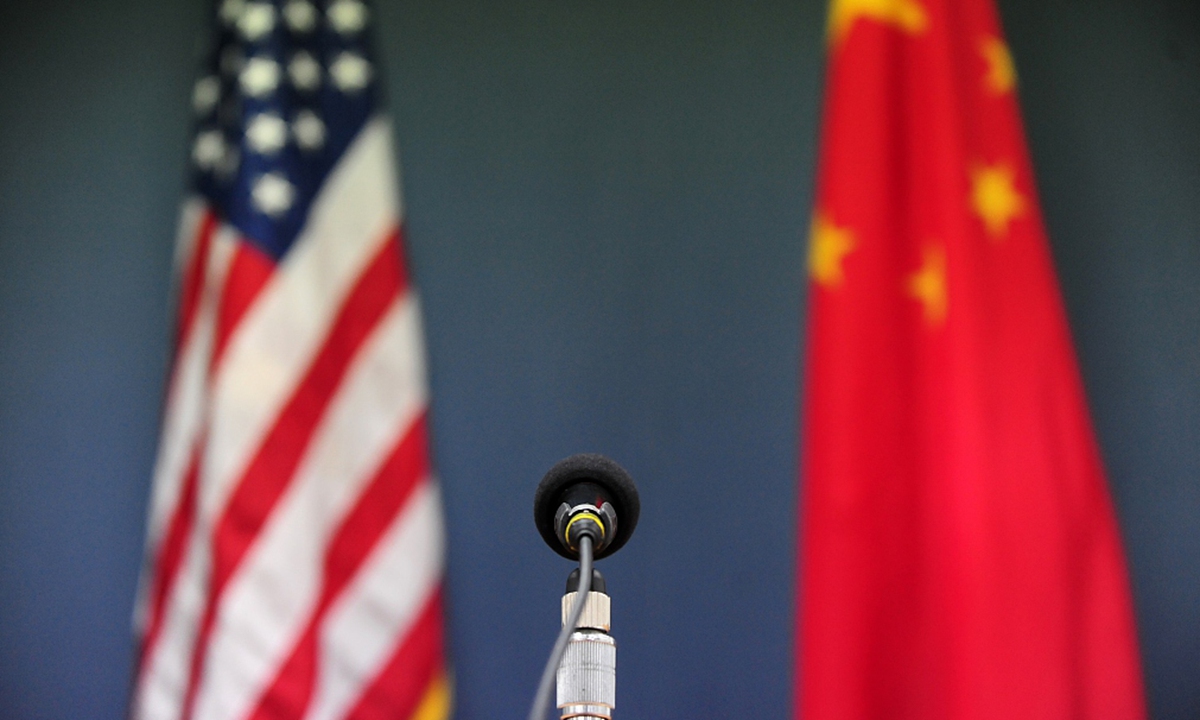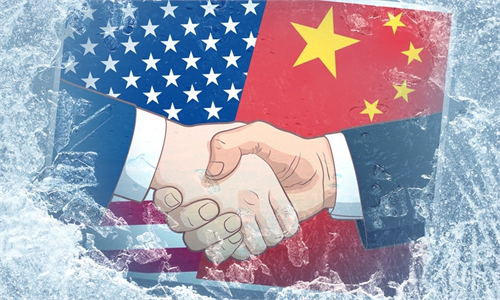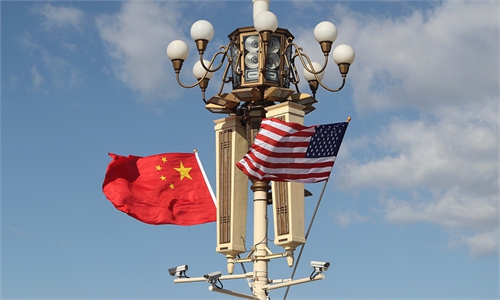
China US Photo:VCG
Speaking at an online forum organized by the National Committee on US-China relations on Tuesday morning Beijing time, Yang Jiechi, a member of the Political Bureau of the Communist Party of China Central Committee and director of the Office of the Foreign Affairs Commission of the CPC Central Committee, called on China and the US to restore their relationship to a predictable and constructive track of development.He said, "China is prepared to work with the US to move the relationship forward along the track of no conflict, no confrontation, mutual respect and win-win cooperation for the well-being of both countries and peoples."
The speech conveyed a consistent message that has been made multiple times by other senior Chinese diplomats, including State Councilor and Foreign Minister Wang Yi. This signals that China hopes to promote the reset of China-US relations as soon as possible.
China-US relations have been gravely jeopardized over the past four years. The Trump administration launched an irrational and destructive crackdown on China with a string of unilateral and bullying measures. This plunged bilateral relations to the lowest point ever since Richard Nixon's groundbreaking visit to China in 1972.
With the Biden administration now in office, there is a fresh chance for a rapprochement to be made. Therefore, China has called for both countries to restore normal relations. This reflects China's goodwill and expectations.
However, it must be pointed out that it requires the US to meet China halfway to bring bilateral relations back to the normal track of development. Joint efforts are needed to prevent bilateral relations from deteriorating into a downward spiral, and to resume the momentum of mutual benefits and win-win cooperation.
A view in the US contends that China should do some specific things first before America acts. But America, who started the troubles, should fix the problem first. The deterioration of China-US relations has mainly been caused by hostile actions taken by Washington, especially under the previous administration.
In this light, Biden's team has the responsibility and obligation to suspend or eliminate the US' punitive policies and measures that have been imposed on China during the past four years. There are many things the Biden administration should do, or take the first step to fix. These include ending the trade war, stopping the harassment on Chinese students and visiting scholars, and working to reopen Confucius Institutes and lift impulsive sanctions upon Chinese universities and companies, etc..
However, judging from the current situation, the US' willingness to mend fences with China is not strong. Remarks made on China by several cabinet members of the Biden administration are so far not constructive. Since being tough on China is the consensus of the two parties in the US, therefore, it seems theonly difference between Trump and Biden now is that the Biden administration may make some minor adjustment to US approaches of dealing with China.
A case in point: US Secretary of State Antony Blinken said in an interview with MSNBC on Monday that China "poses the most significant challenge" to the US internationally. This reflects a tough US posture that it is still guarding against perceived China threats to US hegemony. This is, in fact, not different from the Trump administration's policy positions.
Therefore, we shouldn't harbor too many expectations for China-US relations, or have any unrealistic illusions about the Biden administration's China policies. China hopes for a thaw in bilateral relations. However, if the US stubbornly follows the old path of the Trump administration to confront China, Beijing will have to fight it to the end.
Although China has called for the restoration of China-US cooperation and relations on many occasions, the country is prepared if the US insists on confrontation. Currently, many of China's measures are actually based on "bottom line" thinking. We are prepared for the possibility that China-US relations may continue to be turbulent, or deteriorate further.
For example, China has adopted "dual circulation" policy, which is to a large extent based on bottom line thinking. In the past, China's policymakers have placed great emphasis on international market. If China-US relations further deteriorate, the US' trade sanctions and high-tech embargoes against China will continue. Thus, China can only depend on internal circulation economics and high-tech development on the basis of self -reliance. The bottom line thinking is also reflected in some of China's other plans for the next five years; these include supply chain and industrial chain security, and food security etc...
China has always had a bottom line for the development of China-US relations. In his speech, Yang called on the US to respect the three China-US joint communiqués; stop interference in China's internal affairs including Hong Kong, Xinjiang and Tibet questions; and stop harming China's development interests. Yang also stressed that the US should understand where China's redline is and should not cross the line. This draws China's bottom line regarding the development of China-US relations.
The Trump administration ignored this bottom line and acted recklessly. If this trend continues, it may likely lead to further China-US conflicts.
China must send a signal of willingness to cooperate. Also, after four years of struggle, we have realized that some US politicians and elites dangerously lack a bottom line awareness.
China needs to explain these bottom line points clearly to the US. After all, today's China is different from that in the past. Today, we have more bargaining chips in our hands as well as a stronger ability to deal with unreasonable provocations from the outside world.
The author is deputy director of the Center for American Studies at Fudan University. opinion@globaltimes.com.cn




